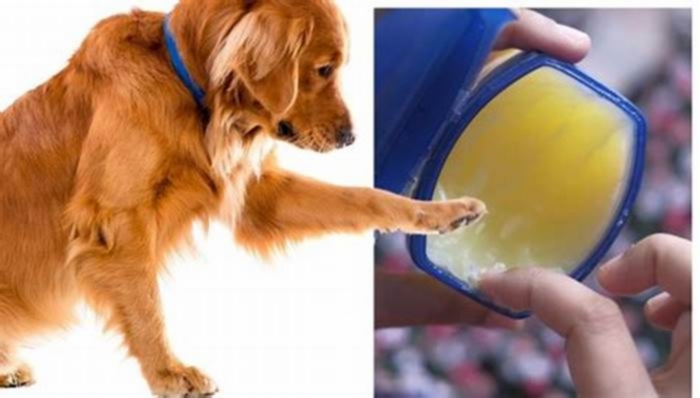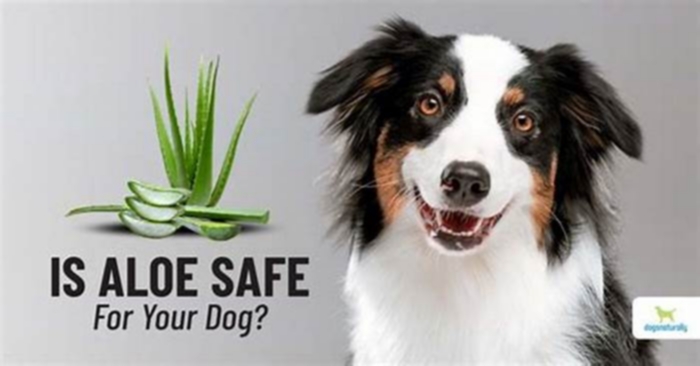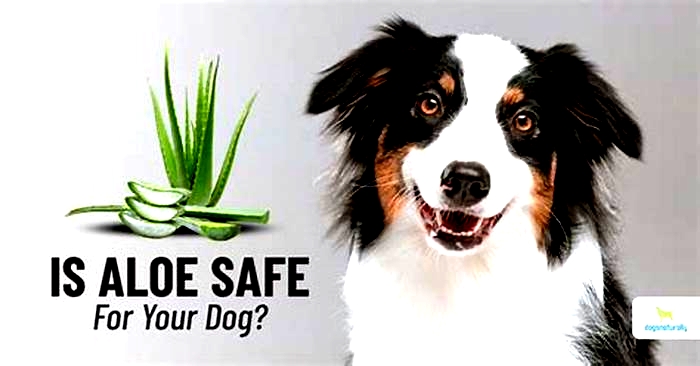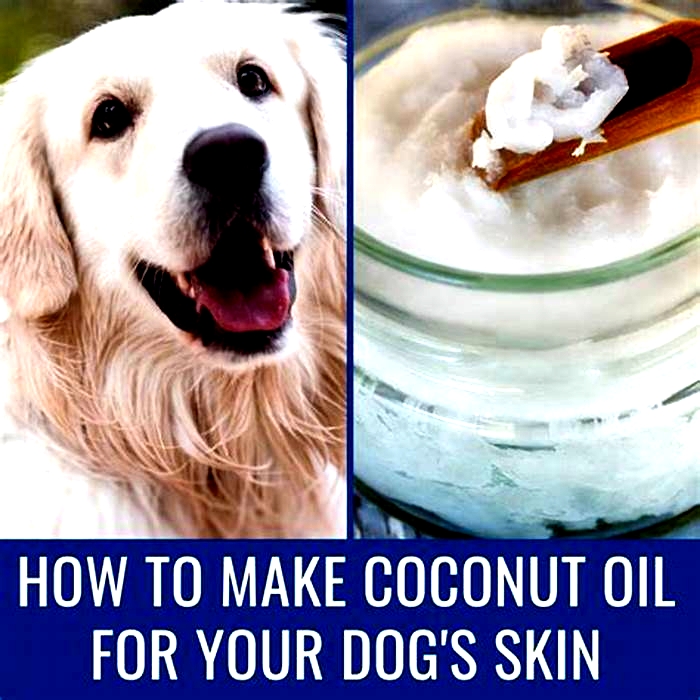What if my dog licks coconut oil

Can I Put Coconut Oil On My Dogs Paws? What If They Lick It Off?
*This page may include affiliate links, which means that if you make a purchase through one of the product links, we may receive a small commission. For full affiliate disclosure please see ourdisclaimerpage.
To get the most out of your dogs paw care routine, you may have considered using coconut oil. This natural and widely available substance can offer many benefits to your dogs paw health. However, its important to know both the potential benefits and risks when using coconut oil on your dogs paws. In this blog, we will answer the question can coconut oil be used on dog paws?. Well explore the benefits and risks of using coconut oil on their paws to help you make an informed decision.

Benefits of using coconut oil on dog paws
Coconut oil is known for its numerous health benefits in humans and can also be used on dogs. Using coconut oil on dog paws has a range of benefits. It can help promote overall health and well-being in dogs.
- Moisturizes the paw pads: Coconut oil helps moisturize the dry and cracked paw pads, making them soft and supple.
- Prevents infections: The medium-chain fatty acids present in coconut oil have antibacterial and antifungal properties. This can help prevent infections in the paws caused by dirt, bacteria, or yeast.
- Protects against environmental hazards: Applying coconut oil on the paws forms a protective layer, shielding the paws from harmful environmental factors such as extreme temperatures, salt, and chemical deicers used on roads.
- Can relieve itchiness: Coconut oil has anti-inflammatory properties that can help soothe and relieve itchy paw pads caused by allergies or other skin conditions.
Apart from these mentioned benefits, using organic coconut oil will ensure that no harsh chemicals are applied to your pups delicate skin. It is always advisable to consult a veterinarian before trying any product on pets.
Incorporating natural remedies like coconut oil into our pets daily routine promotes a healthier lifestyle for them. However, pet owners should pay attention to their pets reactions to new products to avoid any unpleasant side effects.
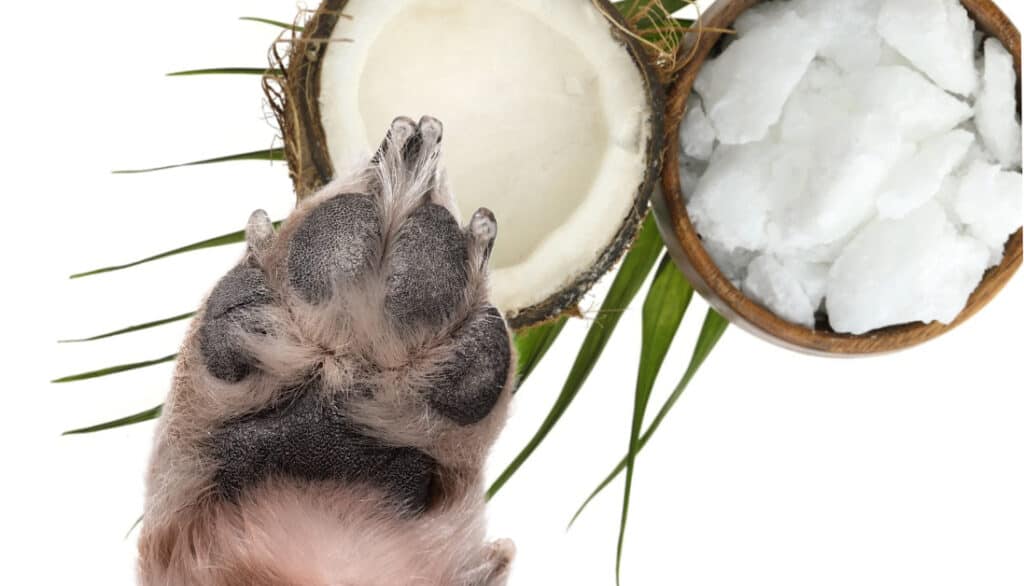
Risks to be aware of when using coconut oil on dog paws
Using coconut oil on dog paws can bring many benefits, but its important to consider the potential drawbacks as well. Potential risks include allergic reactions and an increased risk of bacterial or fungal infections due to moisture retention in the paw pads.
To minimize these risks, its crucial to choose a high-quality, pure coconut oil and apply it sparingly on clean paws. Additionally, monitoring your dog for any adverse reactions is essential.
Its also worth noting that excessive licking of the paws can lead to digestive problems in dogs, so its necessary to avoid applying too much coconut oil or using it too frequently. While using coconut oil on dog paws can promote healthy skin, softening dry pads and aiding in wound healing, its crucial to use proper application techniques and monitor your dog closely for any adverse effects.
In summary, while there are potential benefits to using coconut oil on dog paws, pet owners must be aware of the potential risks associated with improper application or overuse. Proper monitoring and cautious use can help ensure that your furry friend can enjoy all the benefits of this natural remedy without encountering any unwanted side effects.

What if the dog licks off the coconut oil?
To address concerns about your dog licking off coconut oil from their paws, this section will cover some precautionary measures you can take to avoid ingestion. It will also discuss the potential outcomes if your dog ingests coconut oil, so you can better understand the importance of being cautious. Read on to learn more about the benefits and risks of using coconut oil on your dogs paws.
Potential outcomes of a dog ingesting coconut oil
Coconut oil is a popular supplement that many dog owners administer to their pets. However, the ingestion of this substance by dogs may have unintended consequences. Ingesting large amounts of coconut oil may cause diarrhea and an upset stomach in dogs. Additionally, coconut oil has high levels of fat, and excessive consumption can lead to weight gain or pancreatitis. Moreover, if a dog licks off the coconut oil, it could lead to side effects such as irritation and itchiness due to its moisturizing and conditioning properties on the skin.
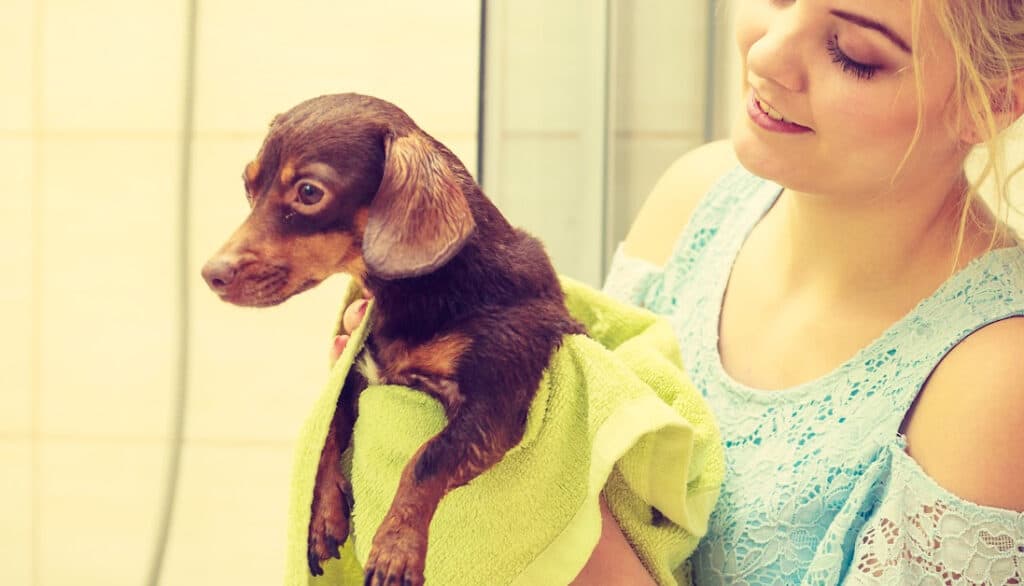
Precautions to take when using coconut oil on dog paws to avoid ingestion
When using coconut oil on dog paws, it is important to take precautions to ensure ingestion is avoided. The following 6-step guide will help pet owners use coconut oil on their dogs paws safely:
- Ensure the dog does not lick the coconut oil: Distract the dog with a toy or treat while applying the coconut oil and supervise them for at least thirty minutes after application.
- Avoid excessive usage: Apply a thin layer of coconut oil to avoid excess build-up which may cause harm to the dog if licked excessively.
- Use food-grade coconut oil: Non-toxic options are crucial when it comes to treating pets with natural remedies such as coconut oil. This prevents any adverse reactions that result from non-friendly ingredients.
- The best times to apply: Paws should be clean and dry before applying the oil. After a bath or grooming session, allow your pets paw skin air-dry, then apply.
- Be alert for any symptoms: If there are any signs of an allergic reaction, contact your veterinarian right away. Symptoms may include redness, swelling or itchiness.
- Wash hands after administering: When handling and applying coconut oil, wash hands thoroughly first with soap and warm water.
It is important to follow these steps when using coconut oil on dog paws as ingestion can lead to digestive issues and other health problems. Pet owners should also purchase quality products for optimal results. By being cautious, pet owners can provide safe and effective treatment for their furry friends.
Remember that safety is the most critical aspect when it comes to providing home remedies such as this one. While using this natural ingredient on your pets paws can benefit them greatly both internally and externally, vigilance in its application must be maintained always.

Alternatives to coconut oil for dog paw care
To find alternatives to coconut oil for your dogs paw care, try using natural alternatives or look for commercial products that can serve the same purpose. In this section with the title Alternatives to coconut oil for dog paw care, we will explore these sub-sections as possible solutions for dog owners who are hesitant to use coconut oil for their dogs.
Natural alternatives to coconut oil
Dogs paws require regular care and attention to prevent them from getting dry, cracked or infected. Using natural remedies is always a great alternative to chemical products that can be harmful to your furry friends health. Here are some organic alternatives to coconut oil that can help you maintain your dogs paw health effortlessly:
- Shea Butter: Provides maximum hydration and nourishment for dogs paws, thanks to its high-fat content.
- Olive Oil: Rich in antioxidants, it has antibacterial properties that reduce inflammation and heal cuts or wounds on pets paw pads.
- Aloe Vera: Has anti-inflammatory properties and a cooling effect that soothe pain and local irritations.
- Bee Wax: Acts as a natural barrier, protecting dogs feet against dirt and harsh outside conditions while providing moisture and healing properties at the same time.
Additionally, cornstarch powder can also work wonders for dog paws with excessive sweating issues. It absorbs excess moisture and reduces foul odors.
We hope you found this article informative in helping you decide on natural alternatives to coconut oil for your furry friends paw care routine. Remember to consult with veterinary professionals before incorporating anything new into their routines!
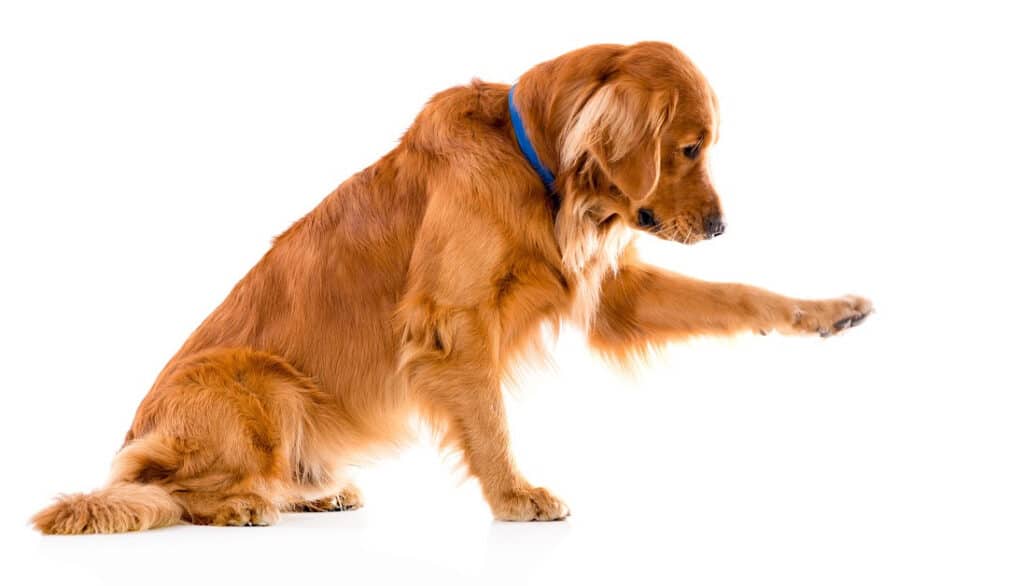
Commercial products that can be used instead of coconut oil
There are various commercial alternatives for dog paw care that can be used as a substitute for coconut oil. These products come with unique formulations and specific benefits that cater to pet parents varying needs.
One option is Mushers Secret, a natural wax-based paw protector that creates a barrier between your dogs paws and harsh surfaces. Another option is Bag Balm, which contains lanolin and plant-based oils that moisturize dry and cracked paws. Additionally, Burts Bees Paw and Nose Lotion provides soothing relief to rough paws while also hydrating the nose.
Its important to note that these products might have additional ingredients, so always check the label before applying them to your furry friends paws. Always consult with your veterinarian if you are unsure about any products you want to use for your pets paw care needs.
Overall, there are several commercial solutions available in the market that can help improve the condition of a dogs paws without using coconut oil. It is essential to select one that fits your dogs specific needs while also adhering to their well-being.

How to properly apply coconut oil to dog paws
To properly apply coconut oil to your dogs paws, this solution with step-by-step guide for application and tips to ensure your dog wont lick it off will be helpful. The sub-sections include a comprehensive guide to applying coconut oil to paws, as well as useful tips to prevent your dog from licking it off during the application process.
Step-by-step guide for applying coconut oil to dog paws
Coconut oil can be used as a natural remedy to soothe dog paws. The process involves applying the oil in a specific manner to ensure maximum benefits. Here is a simple and concise guide on how to properly apply coconut oil to your furry friends paws.
- Step 1: Prepare your dogBefore you start applying coconut oil, ensure your dog is relaxed and ready for the paw massage. You can start by distracting them with toys or treats.
- Step 2: Clean the pawsUse a damp cloth or towel to clean any dirt or debris from your dogs paws.
- Step 3: Apply coconut oilTake some coconut oil and rub it between your palms to warm it up. Gently massage the oil onto each paw pad using circular motions. Ensure that the entire paw is coated with the oil.
- Step 4: Let it soak inAfter applying the coconut oil, let it soak into your dogs paw pads for a few minutes before wiping off any excess with a clean towel.
Apart from leaving their paws feeling moisturized, this method can also prevent dryness and cracking of their pads while providing an antibacterial layer of protection against harmful bacteria.
Remember that every dog is unique, so its important to pay attention to their reactions during this process. If they show signs of discomfort or irritation, discontinue use immediately.
Overall, incorporating this simple yet effective routine into your furry friends grooming regimen can reduce the risk of infections while improving overall paw health.

Tips for ensuring dogs do not lick off coconut oil during application
To prevent dogs from licking off the application of coconut oil to their paws, it is important to follow certain precautions. These include utilizing distraction tactics, using a cone collar/halo, trimming their nails before applying coconut oil, allowing time for absorption, training your dog not to lick or chew on their paws, and supervising them closely during and after application.
- Distraction tactics: Give your dog a treat or toy to play with while you apply the coconut oil.
- Cone Collars/Halo: If necessary, use a cone collar or halo to prevent them from reaching their paws with their mouth.
- Trimming Nails: Trim your dogs nails before applying the coconut oil so theres less chance of injury or skin irritation.
- Allow Time for Absorption: Let your pet rest for some time so that the application is fully absorbed.
- Training against paw licking: Train your dog with positive reinforcement regarding no scratching/chewing/licking his paws when applied with any sort of product.
- Supervision: Keep an eye on your pup for quite some time after application until he has rested so there are minimal chances of injury if they start licking.
Its important to note that different dogs may respond differently to the above measures, depending on their temperament and personality. Using a combination of these techniques could be beneficial in ensuring that the coconut oil remains on your dogs paws and provides all its associated benefits without any harm being done.
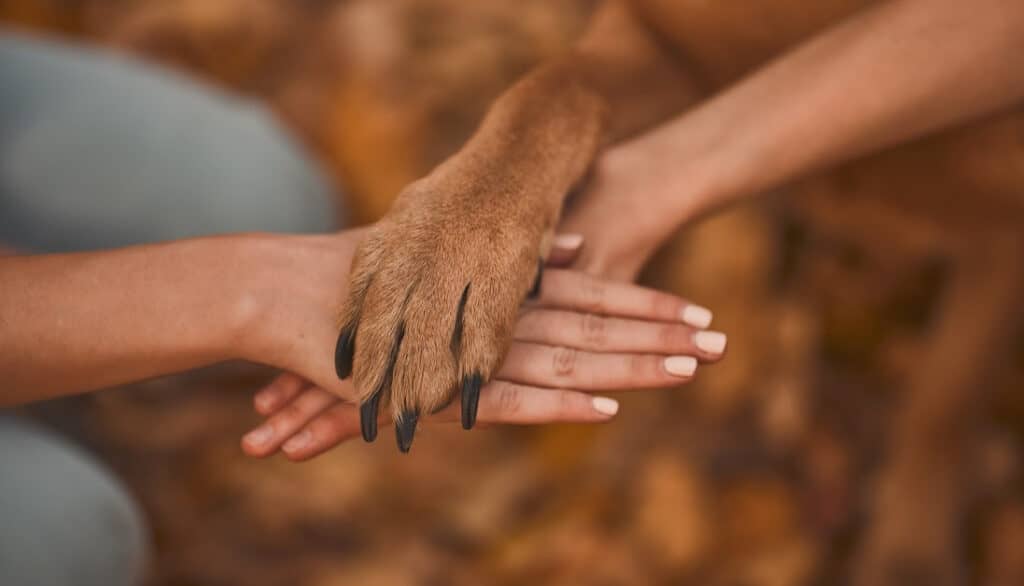
Conclusion and final thoughts
This article delves into whether coconut oil can be used on dogs paws and what to do if they lick it off. The short answer is that coconut oil has many benefits, including moisturizing dry paw pads and combating microbes, but its important to monitor your dogs intake if they decide to lick the oil off. Moreover, while coconut oil may not have adverse effects on most dogs, we recommend consulting with a veterinarian before using any new products on your pets paws.
Frequently Asked Questions
1. Can I put coconut oil on my dogs paws?Yes, you can put coconut oil on your dogs paws as long as they do not have any allergies or sensitivity to coconuts. Coconut oil can help moisturize dry or cracked paws and also has antibacterial properties that can benefit your dogs paw health.
2. Can I use any type of coconut oil?No, you should use only unrefined, organic coconut oil that does not contain any additives or preservatives. This will ensure that your dog is not exposed to harmful substances.
3. What if my dog licks the coconut oil off their paws?Coconut oil is safe for dogs to ingest in small amounts, so if your dog licks the oil off their paws, it should not cause any harm. However, if your dog consumes a large amount of coconut oil, it may cause digestive issues.
4. How often should I apply coconut oil to my dogs paws?You can apply coconut oil to your dogs paws as often as needed, but it is recommended to do it at least once a week to maintain healthy paws.
5. Can coconut oil be used for other purposes on my dog?Yes, coconut oil can also be used as a natural conditioner for your dogs coat, as well as an ingredient in homemade dog treats. However, always consult with your veterinarian before using coconut oil or any other natural remedies on your dog.
6. Can I use other oils on my dogs paws?Yes, you can use other oils such as olive oil or almond oil on your dogs paws, but you should make sure that your dog is not allergic to these oils before using them. Always consult with your veterinarian before using any oils on your dog.


